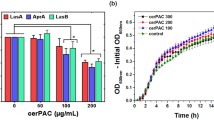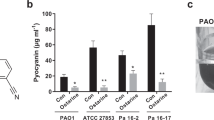Abstract
Quorum sensing (QS), a communication system involved in virulence of pathogenic bacteria like Pseudomonas aeruginosa is a promising target to combat multiple drug resistance. In vitro studies using clove bud oil (CBO) in P. aeruginosa revealed a concentration dependent attenuation of a variety of virulence factors including motility, extracellular DNA, exopolysaccharides and pigment production. Furthermore, treatment with CBO demonstrated a distinct dose-dependent reduction in biofilm formation as well as promoting dispersion of already formed biofilm, observations that were also supported by porcine skin ex vivo studies. Expression studies of genes involved in signalling systems of P. aeruginosa indicated a specific decrease in transcription of pqsA, but not in the lasI or rhlI levels. Additionally, the expression of vfr and gacA genes, involved in regulation, was also not affected by CBO treatment. CBO also influenced the PQS signalling pathway by decreasing the levels of kynurenine, an effect which was reversed by the addition of exogenous kynurenine. Though the synthesis of the signalling molecules of the Las and Rhl pathways was not affected by CBO, their activity was significantly affected, as observed by decrease in levels of their various effectors. Molecular modelling studies demonstrated that eugenol, the major component of CBO, favourably binds to the QS receptor by hydrophobic interactions as well as by hydrogen bonding with Arg61 and Tyr41 which are key amino acid residues of the LasR receptor. These results thus elucidate the molecular mechanism underlying the action of CBO and provide the basis for the identification of an attractive QS inhibitor.










Similar content being viewed by others
References
Adonizio AL, Kong KF, Mathee K (2008) Inhibition of quorum sensing controlled virulence factor production in P. aeruginosa by South Florida plant extract. Antimicrob Agents Chemother 52:198–203. doi:10.1128/AAC.00612-0
Aliaga L, Mediavilla JD, Cobo F (2002) A clinical index predicting mortality with P.aeruginosa bacteraemia. J Med Microbiol 51:615–661. doi:10.1099/0022-1317-51-7-615
Bacalso M, Xu T, Yeung K, Zheng D (2011) Biofilm formation of P. aeruginosa PA14 required lasI and was stimulated by the Pseudomonas quinolone signal although salicylic acid inhibition is independent of the PQS pathway. J Exp Microbiol Immun 15:84–89
Bhowmik D, Sampathkumar KP, Yadav A, Srivastava S, Paswan S, Dutta A (2012) Recent trends in Indian traditional herb Syzygium aromaticum and its health benefits. J Pharmacogn Phytochem 1(1):13–22
Cady NC, McKean KA, Behnke J, Kubec R, Mosier AP, Stephen H, Kasper SH, Burz DS, Musah RA (2012) Inhibition of biofilm formation, quorum sensing and infection in Pseudomonas aeruginosa by natural products-inspired organosulfur compounds. PLoS One 7(6):e38492. doi:10.1371/journal.pone.0038492
Calfee MW, Coleman JP, Pesci EC (2001) Interference with Pseudomonas quinolone signal synthesis inhibits virulence factor expression by P. aeruginosa. Proc Natl Acad Sci U S A 98:11633–11637. doi:10.1073/pnas.201328498
Chaieb K, Hajlaoui H, Zmantar T, Kahla-Nakbi AB, Rouabhia M, Mahdouani K, Bakhrouf A (2007) The chemical composition and biological activity of clove essential oil, Eugenia caryophyllata (Syzigium aromaticum L. Myrtaceae): a short review. Phyother Res 21:501–506. doi:10.1002/ptr 2124
Das T, Manefield M (2012) Pyocyanin promotes extracellular DNA release in P. aeruginosa. PLoS ONE 7(10):e46718. doi:10.1371/journal.pone.0046718
Das T, Kutty SK, Kumar N, Manefield M (2013) Pyocyanin facilitates extracellular DNA binding to P. aeruginosa influencing cell surface properties and aggregation. PLoS ONE 8(3):e58299. doi:10.1371/journal.pone.0058299
Farrow JM III, Pesci EC (2007) Two distinct pathways supply anthranilate as a precursor of the Pseudomonas quinolone signal. J Bacteriol 189(9):3425–3433. doi:10.1128/JB.00209-07
Genestet C, Gouellec AL, Chaker H, Polack B, Guery B, Toussaint B, Stasia MJ (2014) Scavenging of reactive oxygen species by tryptophan metabolites help P. aeruginosa escape neutrophil killing. Free Radic Biol Med 73:400–410. doi:10.1016/j.freeradbiomed.2014.06.003
Gloag ES, TurnbullL HA, Vallotton P, Wang H, Nolan M, Mililli L, Hunt C, Lu J, Osvath SR, Monahan LG, Cavaliere R, Charles GI, Wand MP, Gee ML, Prabhakar R, Whitchurch CB (2013) Self-organization of bacterial biofilms is facilitated by extracellular DNA. Proc Natl Acad Sci U S A 110(28):11541–11546. doi:10.1073/pnas.1218898110
Heeb S, Fletcher MP, Chhabra SR, Diggle SP, Williams P, Cámara M (2011) Quinolones from antibiotics to autoinducers. FEMS Microbiol Rev 35:247–274. doi:10.1111/j.1574-6976.2010.00247
Jimenez PN, Koch G, Thompson JA, Xavier KB, Cool RH (2012) The multiple signalling systems regulating virulence in Pseudomonas aeruginosa. Microbiol Mol Biol Rev 76:46–65. doi:10.1128/MMBR.05007-11
Johnansson EM, Cruz SA, Kolomiets E, Buts L, Kadam RU, Cacciarini M, Bartels KM, Diggle SP, Camara M, Williams P, Loris R, Nativi C, Rosenau F, Jaeger KE, Darbre T, Reymond JL (2008) Inhibition and dispersion of P.aeruginosa biofilm by glycopeptide dendrimers targeting the fucose—specific lectin LecB. Chem Biol 15:1249–1257. doi:10.1016/j.chembiol.2008.10.009
Kay E, Humair B, De’nervaud V, Riedel K, Spahr S, Eberl L, Valverde C, Haas D (2006) Two GacA-dependent small RNAs modulate the quorum sensing response in P. aeruginosa. J Bacteriol 188:6026–6033. doi:10.1128/JB.00409-06
Kim HS, Lee SH, Byun Y, Park HD (2015) 6-Gingerol reduces P. aeruginosa biofilm formation and virulence via quorum sensing inhibition. Sci Rep 5:8656. doi:10.1038/srep08656/srep08656
Klausen M, Heydorn A, Ragas P, Lambertsen L, Aaes-Jørgensen A, Molin S, Tolker-Nielsen T (2003) Biofilm formation by P. aeruginosa wild type, flagella and type IV pili mutants. Mol Microbiol 48:1511–1524. doi:10.1046/j.1365-2958.2003.03525
Kruczek C, Qaisar U, Colmer-Hamood JA, Hamood AN (2014) Serum influences the expression of P.aeruginosa quorum sensing genes and QS-controlled virulence genes during early and late stages of growth. MicrobiologyOpen 3(1):64–79. doi:10.1002/mbo3.147
Köhler T, Curty LK, Barja F, van Delden C, Pechère J-C (2000) Swarming of P. aeruginosa is dependent on cell-to-cell signalling and requires flagella and pili. J Bacteriol 182(21):5990–5996. doi:10.1128/JB.182.21.5990-5996.2000
Liang H, Duan J, Sibley CD, Surette MG, Duan K (2011) Identification of mutants with altered phenazine production in P. aeruginosa. J Med Microbiol 60(1):22–34. doi:10.1099/jmm.0.022350-0
Mahady GB (2005) Medicinal plants for the prevention and treatment of bacterial infections. Curr Pharm Des 11:2405–2427
Marketon MM, Glenn SA, Eberhard A, González JE (2003) Quorum sensing controls exopolysaccharide production in Sinorhizobium mliloti. J Bacteriol 185(1):325–331. doi:10.1128/JB
Matsukawa M, Greenberg EP (2004) Putative exopolysaccharide synthesis genes influence P. aeruginosa biofilm development. J Bacteriol 186(14):4449–4456. doi:10.1128/JB.186.14.4449-4456.2004
Mavrodi DV, Bonsall RF, Delaney SM, Soule MJ, Phillips G, Thomashow LS (2001) Functional analysis of genes for biosynthesis of pyocyanin and phenazine-1-carboxamide from P. aeruginosa PAO1. J Bacteriol 183:6454–6465. doi:10.1128/JB.183.21.6454-6465.2001
Meynard JL, Barbut F, Guiguet M, Batisse D, Lalande V, Lesage D, Guiard-Schmid JB, Petit JC, Frottier J, Meyohas MC (1999) Pseudomonas aeruginosa infection in human immunodeficiency virus infected patients. J Infect 38:176–181
Myska K, Czaczk K (2009) Characterization of adhesive exopolysacchride (EPS) produced by P. aeruginosa under starvation conditions. Current Microbiol 58(6):541–546. doi:10.1007/s00284-009-9365-3
Nanjan P, Nambiar J, Nair BG, Banerji (2015) Synthesis and discovery of (I-3, II-3) -biacacetin as a novel non-zinc binding inhibitor of MMP-2 and MMP-9. Bioorg Med Chem 23:3781–3787. doi:10.1016/j.bmc.2015.03.084
Nataraj N, Anjusree GS, Madhavan AA, Priyanka P, Sankar D, Nisha N, Lakshmi SV, Jayakumar R, Balakrishnan A, Biswas R (2013) Synthesis and anti-staphylococcal activity of TiO2 nanoparticles and nanowires in ex vivo porcine skin model. J Biomed Nanotechnol 9:1–7. doi:10.1166/jbn.2013.1756
Oh J, Lee NR, Jo W, Jung WK, Lim JS (2009) Effects of substrates on biofilm formation observed by atomic force microscopy. Ultramicroscopy 109:874–880. doi:10.1016/j.ultramic.2009.03.042
Oncul O, Ulkur E, Acar A (2009) Prospective analysis of nosocomial infections in a burn care unit, Turkey. Indian J Med Res 130:758–764
Pesci EC, Pearson JP, Seed PC (1997) Regulation of las and rhl quorum sensing in P. aeruginosa. J Bacteriol 179:3127–3132
Quave CL, Planto LR, Pantuso T, Bennet BL (2008) Effect of Italian medicinal plants on planktonic growth, biofilm formation and adherence of methicillin resistant S. aureus. J Ethanopharmacol 118(3):418–428. doi:10.1016/j.jep.2008.05.005
Rashid MH, Kornberg A (2000) Inorganic polyphosphate is needed for swimming, swarming, and twitching motilities of P. aeruginosa. Proc Natl Acad Sci USA 97:4885–4890. doi:10.1073/pnas.060030097
Rumbaugh KP, Griswold JA, Hamood AN (2000) The role of quorum sensing in in vivo virulence of Pseudomonas aeruginosa. Microbes Infect 2(14):1721–1731. doi:10.1016/S1286-4579(00)01327-7
Sanlin JR, Lemos M, Klein-Junior LC, Machado ID, Costa P, de Oliveira AP, Tilia C, de Souza JP, Bastos JK, de Andrade SF (2011) Gatroprotective activity of essential oil of Syzygium aromaticum and its major component eugenol in different animal models. Naunyn Schmiedeberg’s Arch Pharmacol 383(2):149–159. doi:10.1007/ 5002-010-2582
Serate J, Roberts GP, Berg O, Youn H (2011) Ligand responses of Vfr, the virulence factor regulator from P. aeruginosa. J Bacteriol 193:4859–4868. doi:10.1128/JB.00352-11
Shaaban HAE, Ei-Ghorab AH, Shibamoto T (2012) Bioactivity of essential oils and their volatile aroma compounds: review. J Essent Oil Res 24(2):203–212
Stintzi A, Evans K, Meyer JM, Poole K (1998) Quorum-sensing and siderophore biosynthesis in P. aeruginosa lasR/lasI mutants exhibit reduced pyoverdine biosynthesis. FEMS Microbiol Lett 166:341–345
Szabó MA, Varga GZ, Hohmann J, Schelz Z, Szegedi E, Amaral L, Molnár J (2010) Inhibition of quorum-sensing signals by essential oils. Phytother Res 24:782–786. doi:10.1002/ptr.3010
Tamma PD, Cosgrove SE, Maragakis LL (2012) Combination therapy for treatment of infections with Gram-negative bacteria. Clin Microbiol Rev 25(3):450–470. doi:10.1128/CMR.05041-11
Thenmozhi R, Nithyanand P, Rathna J, Pandian SK (2009) Antibiofilm activity of coral associated bacteria against different clinical M serotypes of Streptococcus pyogenes. FEMS Immunol Med Microbiol 57:284–294. doi:10.1111/j.1574-695X.2009.00613.x
Venturi V (2006) Regulation of quorum sensing in Pseudomonas. FEMS Microbiol Rev 30:274–291
Wei Q, Tarighi S, Dötsch A, Häussler S, Müsken M, Wright VJ, Cámara M, Williams P, Haenen S, Boerjan B, Bogaerts A, Vierstraete E, Verleyen P, Schoofs L, Willaert R, De Groote VN, Michiels J, Vercammen K, Crabbé A, Cornelis P (2011) Phenotypic and genome-wide analysis of an antibiotic-resistant small colony variant (SCV) of P. aeruginosa. PLoS One 6(12):e29276. doi:10.1371/journal.pone.0029276
Wei Q, Ma LZ (2013) Biofilm matrix and its regulation in P. aeruginosa. Int J Mol Sci 14(10):20983–21005. doi:10.3390/ijms141020983
Yang L, Barken KB, Skindersoe ME, Christensen AB, Givskov M, Tolker-Nielsen (2007) Effect of iron on DNA release and biofilm development in P. aeruginosa. Microbiology 153:1318–1328. doi:10.1099/mic.0.2006/004911-0
Yang L, Nilsson M, Gjermansen M, Givskov M, Tolker-Nielsen T (2009) Pyoverdine and PQS mediated subpopulation interactions involved in P. aeruginosa biofilm. Mol Microbiol 74(6):1380–1392. doi:10.1111/j.1365-2958.2009.06934.x
Yang Q, Phillips PL, Sampson EM, Progulske-Fox A, Jin S, Antonelli P, Schultz GS (2013) Development of a novel ex vivo porcine skin explant model for the assessment of mature bacterial biofilms. Wound Repair Regen 21:704–714. doi:10.1111/wrr.12074
Yildis HF, Schoolnik GK (1999) Vibrio cholerae O1 El Tor: identification of a gene cluster required for the rugose colony type, exopolysaccharide production, chlorine resistance, and biofilm formation. Proc Natl Acad Sci U S A 96:4028–4033
Zhang YM, Frank MW, Zhu K, Mayasundari A, Rock CO (2008) PqsD is responsible for the synthesis of 2, 4-dihydroxyquinoline, an extracellular metabolite produced by P. aeruginosa. J Biol Chem 283:28788–28794. doi:10.1074/jbc.M804555200
Acknowledgments
The authors graciously acknowledge Sri Mata Amritanandamayi, Chancellor, Amrita University, for her constant support and guidance.
Author information
Authors and Affiliations
Corresponding author
Ethics declarations
This article does not contain any studies with human participants performed by any of the authors. Approval for experiments in this study to be conducted with porcine skin was obtained from the Institutional Ethics Committee.
Conflict of interest
The authors declare that they have no competing interests.
Electronic supplementary material
ESM 1
(PDF 288 kb)
Rights and permissions
About this article
Cite this article
H., J., Omanakuttan, A., Pandurangan, N. et al. Clove bud oil reduces kynurenine and inhibits pqs A gene expression in P. aeruginosa . Appl Microbiol Biotechnol 100, 3681–3692 (2016). https://doi.org/10.1007/s00253-016-7313-2
Received:
Revised:
Accepted:
Published:
Issue Date:
DOI: https://doi.org/10.1007/s00253-016-7313-2




